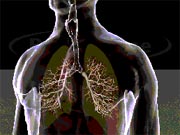Fighting Our Biggest Cancer Killer

Almost 90 per cent of Australians with lung cancer
will be dead within five years of diagnosis
The Australian Lung Foundation will this Friday (15 March 2002) issue a public call for early detection and diagnosis of lung cancer in fighting our nation's BIGGEST cancer killer.
Leading Australian specialists have warned that early detection of lung cancer is the difference between life and death, and is critical if we are to lift our survival rate in line with international best practice. With early detection and caring for victims in the proper fashion, Australia should be able to offer a higher survival rate.
In the US, 15 per cent of lung cancer sufferers survive for five years or more. The Australian figure is 11 per cent.
This issue and other barriers to the best treatment and management of lung cancer are the focus of this weekend's Hong Kong conference of international experts and advocacy groups from Australia, the UK and Canada.
Lung cancer kills more Australians than any other type of cancer with almost 90 per cent dying within five years of diagnosis.
According to The Australian Lung Foundation chairman, thoracic physician Dr Bob Edwards, part of the problem is that lung cancer is a silent killer. It may be virtually without symptoms until it's too late.
"But if we can detect it early," Dr Edwards said, "we can offer patients aggressive treatment such as surgery, that greatly increases their chance of a cure."
Sydney cardiothoracic surgeon, Professor Brian McCaughan, says: "We are talking about the difference between life or death."
"If you're a smoker or were a smoker for more than 20 years, see your GP and discuss having a regular chest X-ray to help find lung cancer early."
"You've got to remember," Prof McCaughan said, "that other potential treatments such as drugs or vaccines to cure or prevent the disease are likely to be decades away."
Writer Dorothy Horsfield, whose husband journalist Paul Lyneham died of lung cancer in November 2000, has joined the campaign for more diligent screening.
"By the time Paul was diagnosed, his tumour was the size of a cricket ball," she said.
"If he'd had a lung X-ray six months earlier, there's a good chance he'd still be alive."
Dr Edwards said: "The trouble is there are barriers to early diagnosis and treatment.
"Australian smokers with lung cancer don't tend to seek early treatment because they don't believe it can happen to them and they also feel guilty about developing a disease they have self-inflicted.
"As well, Australian doctors don't tend to treat aggressively patients diagnosed with lung cancer because they are very pessimistic about whether it will make any difference to their ultimate survival," he said.
"In some instances, they too are skewed by the fact that it is a self-inflicted disease."
Prof McCaughan said best practice management of lung cancer was essentially multi-disciplinary care.
"All patients should be seen in the setting of a multi-disciplinary clinic where all people are represented who treat the cancer - medical, surgical, medical oncology, palliative care doctors, radiation doctors and all the support staff who are very important in the overall care of the patients."
According to Ms Horsfield: "A diagnosis of lung cancer feels like a death sentence and it takes all your courage and determination to deal with it.
"At the same time, I agree it's important that you have a multi-disciplinary approach and that any mainstream medical treatment is complemented by good counselling, a healthy diet, massage therapy, physiotherapy and all the things that can improve your quality of care."
Ms Horsfield said the international meeting in Hong Kong was absolutely overdue.
"Lung cancer is the leading cause of cancer death in the world. Worse still, it's killing around one third of all cancer sufferers," she said.
"What I hope they are saying in Hong Kong is that we really have to devote resources internationally to this disease."
Prof McCaughan said the solution to improving the situation for Australians with this "unfashionable and vicious disease" involved "a heightened campaign by cancer organisations such as The Australian Lung Foundation and the State cancer councils; consumer groups, patients and their carers telling us [health professionals] what we're doing right and wrong; and above all, we require greater State and Federal government involvement in terms of dollars."
Information and support for people with lung cancer and their carers is available from The Australian Lung Foundation [1800 654 301 or www.lungnet.org.au], which has branches in each State, and from the various State-based cancer councils.
MORE
- Is Your Dad at Risk of Type 2 Diabetes?
- Australian-First Trial Examining Physical and...
- Dr Suzan Bekir Rosacea Treatment Interview
- Rebecca Hepatitis C Interview
- Cheryl Talent Eczema Awareness Month Interview
- Dee Honeychurch Paediatric Stroke Awareness...
- Have You Planned Your Heart Attack
- Sally Carkeet Living with Rheumatoid Arthritis...
- Managing Eczema Flare-Ups This Spring
- Rheumatoid Arthritis



